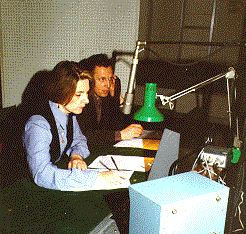 The program has been broadcast throughout
Russia and several former Soviet republics by the Russian State Radio Company "Radio
of Russia" since January 1992. In different periods it lasted from 20 to 25 minutes
and was on air 3 or 5 times a month. With the audience of 50-70 million people Radio of
Russia has one of the highest ratings in Russia.
The program has been broadcast throughout
Russia and several former Soviet republics by the Russian State Radio Company "Radio
of Russia" since January 1992. In different periods it lasted from 20 to 25 minutes
and was on air 3 or 5 times a month. With the audience of 50-70 million people Radio of
Russia has one of the highest ratings in Russia.
Legal education, human rights in the criminal justice system, changes
in the legislation, activity of national and international non-governmental organizations,
situation in various correctional-labor institutions, religious life in penitentiary
institutions, prisoners' creative activity, etc. are the subjects of our broadcast.
The audience of "OBLAKA" radio broadcast is rather big and
consists mostly of prisoners, their relatives, ex-prisoners, human rights activists,
prison and law enforcement bodies workers as well as those who are involved in legal
issues and crime prevention problems. About one million people are incarcerated in Russian
penitentiary institutions of various types. According to experts' estimates from 15 to 20
percent of active population are ex-prisoners.
In different years the program listeners accounted for 4 to 9 percent
of the adult Russian population, in 1994 it was about 8 percent, that is approximately 9
million people beside prisoners. For many prisons and prison camps radio remains the only
source of information, because of the lack of TV sets and high price of newspapers, which
are not received regularly in the province.
Radio broadcast "OBLAKA" stands high in experts', mass media
and listeners' opinion. From 300 to 500 letters from almost all regions of Russia come
every month in response to the program. It should be noted, that the number of negative
letters accusing "OBLAKA" working group of complicity to criminals and murderers
has reduced. Thus, we can speak about a certain influence of the broadcast on the public
opinion, which formed a more correct notion about problems in the criminal justice system.
There were cases, when our broadcasts changed the human rights
situation to the better in certain penitentiary institutions or improved the position of
some particular prisoners (for example, tortures were stopped, some prisoners were
released, some institutions received humanitarian aid, etc.). "OBLAKA" made its
contribution to the adoption of new laws, bringing prison conditions in conformity with
international standards.
The project of establishing radio broadcast "OBLAKA" was
worked out by the Moscow Center for Prison Reform in 1991 and its
associates take the most active part in the preparation of the program.
As far as we know, "OBLAKA" is the only program in the world
completely devoted to prison matters, having such an extensive audience.